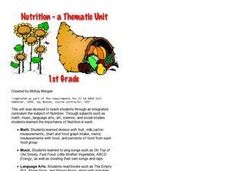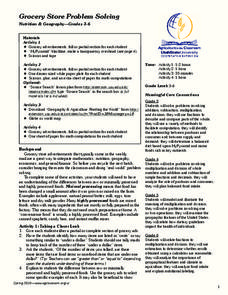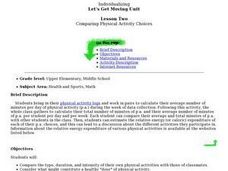Baylor College
Food Webs
Explore various ecosystems from around the world as your class discovers the interdependence of all living things. Using the provided sets of ecosystem cards, young scientists work in small groups building food webs to demonstrate the...
Baylor College
What Dissolves in Water?
One of water's claims to fame is as the universal solvent. Young physical scientists experiment to discover which materials dissolve in this special compound. You could never be more prepared for teaching this lesson than by using this...
Curated OER
Family Fitness
Learners visit sites that contain information about a variety of health and fitness activities. They analyze the activities according to several criteria, and describe how their particular activity choices can contribute to a healthy...
Curated OER
Nutrition: A Thematic Unit
Young learners explore nutrition and the food groups in these two mini-lesson plan ideas. First, kindergarteners have a discussion about their health and how different foods contribute to it before making their own personal food pyramid....
Baylor College
How Do We Use Water?
Send youngsters home to survey how they use water in their homes. Then bring them together to discuss which uses are essential for our health and which are not. A helpful video offers teaching tips for this lesson, and a presentation...
Baylor College
Using Food Labels
Help your class make sense of nutrition labels with the ninth instructional activity of this series. After explaining the different information provided on packaged food labels, perform an activity that demonstrates the amount of sugar...
Curated OER
Grocery Store Problem Solving
Young scholars use multiple math skills to complete grocery story problems. In this grocery math lesson, students study grocery ads to learn about the cost of foods. Young scholars investigate food types and the costs of processed versus...
Curated OER
Next Year's Seeds
Sixth graders explore agricultural issues using math and probabilities. In this agriculture lesson, 6th graders investigate real world situations in agriculture using math and probabilities.
Curated OER
Keeping a Physical Activity Log
This study asks students to keep a log at home of their daily physical activities for at least one or two weeks. They bring their logs back to class. They compare the activities and discuss different levels of intensity.
Curated OER
Comparing Physical Activity Choices
A physical activity log will help your elementary students keep track of their activities. Your class will calculate the average number of physicaly active minutes per day. They compare with other students and then estimate the relative...
Curated OER
Health/Wellness
Students role-play the role of an employee of the Center for Disease Control. In groups, they identify and discuss the functions of the major body systems and analyze their family tree. They watch a video about plagues and calculate...
Curated OER
Home Living / Daily Living: Dressing for the Weather
What to wear? Help your special needs class make independent choices about what they should wear during various weather conditions. They'll discuss weather-appropriate clothing, dress dolls for the weather outside, and even put on a...
Curated OER
Two Digit Addition Without Regrouping
No regrouping required. Hone basic subtraction skills with 20 problems. Learners subtract double-digit numbers.
Baylor College
What's Is Soil Made Of?
It's time to roll up those sleeves and get a little dirty in the second lesson of this series on the science of food. Investigate where plants and animals get the minerals they need to live in this two-part exploration of soil. First,...
Baylor College
Heart and Lungs
With a partner, youngsters measure their pulse and breathing rates, both at rest and after running in place for a minute. While this activity is not novel, the lesson plan includes a large-scale classroom graphing activity and other...
Baylor College
Rainbow in the Room
Uncover the science behind the beautiful phenomena of rainbows with a simple demonstration. Shine light through different-sized containers of water as young scientists learn that rainbows occur when visible light is split up into its...
Baylor College
Fossil Fuels and the Carbon Cycle
Humans are quickly depleting Earth's fossil fuels and locating them is becoming increasingly difficult! Layered muffins are used for models as young geologists take core samples in order to determine the presence of oil. Consider first...
Baylor College
Fuel for Living Things
During a three-part lesson plan, learners make a cabbage juice pH indicator and use it to analyze the waste products of yeast after feeding them with sugar. The intent is to demonstrate how living organisms produce carbon dioxide, which...
Baylor College
Finding the Carbon in Sugar
In session one, demonstrate for your class how a flame eventually goes out when enclosed in a jar in order to teach that oxygen is required for combustion. In session two, class members then burn sugar in a spoon to observe how it...
Baylor College
What Is the Water Cycle?
Small groups place sand and ice in a covered box, place the box in the sunlight, then observe as evaporation, condensation, and precipitation occur. These models serve as miniature water cycles and demonstrations of the three phases of...
Baylor College
What Makes Water Special?
Get close up and personal with a drop of water to discover how the polarity of its molecules affect its behavior. Elementary hydrologists split and combine water droplets, and also compare them to drops of oil. Much neater than placing a...
Baylor College
There's Something in the Air
Clever! In order to compare indoor and outdoor dispersal rates for the movement of gases and particles through air, collaborators will participate in a classroom experiment. Set up a circular grid and set learners on lines that are...
Baylor College
Dust Catchers
In class, your emerging environmentalists construct dust catchers. They take them home for a week or two, and then bring them back into class to examine under a magnifier. From this activity, they learn what makes up dust and that...
Baylor College
Moving Air
In lab groups, young scientists place aluminum cans with a bubble-solution cap into different temperatures of water to see what size of bubble dome forms. As part of an atmosphere unit in preparation for learning about convection...

























